- Home
- Ian Buruma
Occidentalism
Occidentalism Read online
Table of Contents
Title Page
Copyright Page
Dedication
[WAR AGAINST THE WEST]
[THE OCCIDENTAL CITY]
[HEROES AND MERCHANTS]
[MIND OF THE WEST]
[THE WRATH OF GOD]
[SEEDS OF REVOLUTION]
[NOTES]
[INDEX]
[ABOUT THE AUTHORS]
[ALSO BY IAN BURUMA]
Inventing Japan, 1853-1964
Bad Elements: Chinese Rebels from Los Angeles to Beijing
The Missionary and the Libertine: Love and War in East and West
Anglomania: A European Love Affair
The Wages of Guilt: Memories of War in Germany and Japan
Playing the Game
God’s Dust: A Modern Asian Journey
Behind the Mask: On Sexual Demons, Sacred Mothers, Transvestites,
Gangsters and Other Japanese Cultural Heroes
[ALSO BY AVISHAI MARGALIT]
The Ethics of Memory
Views and Reviews: Politics and Culture in the State of the Jews
The Decent Society
Idolatry (with Moshe Halbertal )
THE PENGUIN PRESS
a member of
Penguin Group (USA) Inc.
375 Hudson Street
New York, New York 10014
Copyright © Ian Buruma and Avishai Margalit, 2004
All rights reserved
Portions of this book appeared in different form in an essay entitled “Occidentalism,”
The New York Review of Books, January 17, 2002.
Grateful acknowledgment is made for permission to reprint excerpts from “Choruses
from ‘The Rock’ ” from Collected Poems 1909-1962 by T. S. Eliot. Copyright 1936
by Harcourt, Inc. Copyright © 1964, 1963 by T. S. Eliot.
, and Faber and Faber.
Library of Congress Cataloging-in-Publication Data
Buruma, Ian.
Occidentalism : the West in the eyes of its enemies /
Ian Buruma and Avishai Margalit.
p. cm.
Includes index.
eISBN : 978-1-101-09941-4
1. Civilization, Western. 2. Developing countries—
Civilization—Western influences.
I. Margalit, Avishai, 1939- II. Title.
CB245.B
303.48’172401821—dc22
This book is printed on acid-free paper.
Without limiting the rights under copyright reserved above, no part of this publication may be reproduced, stored in or introduced into a retrieval system, or transmitted, in any form or by any means (electronic, mechanical, photocopying, recording, or otherwise), without the prior written permission of both the copyright owner and the above publisher of this book.
The scanning, uploading, and distribution of this book via the Internet or via any other means without the permission of the publisher is illegal and punishable by law. Please purchase only authorized electronic editions and do not participate in or encourage electronic piracy of copyrighted materials. Your support of the author’s rights is appreciated.
http://us.penguingroup.com
For Robert B. Silvers
[WAR AGAINST THE WEST]
IN JULY 1942, JUST SEVEN MONTHS AFTER THE JAPANESE bombed the American fleet in Pearl Harbor and overwhelmed the Western powers in Southeast Asia, a number of distinguished Japanese scholars and intellectuals gathered for a conference in Kyoto. Some were literati of the so-called Romantic Group; others were philosophers of the Buddhist/ Hegelian Kyoto School. Their topic of discussion was “how to overcome the modern.”1
It was a time of nationalist zeal, and the intellectuals who attended the conference were all nationalists in one way or another, but oddly enough the war itself, in China, Hawaii, or Southeast Asia, was barely mentioned. At least one of those attending, Hayashi Fusao, a former Marxist turned ardent nationalist, later wrote that the assault on the West had filled him with jubilation. Even though he was in freezing Manchuria when he heard the news, it felt as though dark clouds had lifted to reveal a clear summer sky. No doubt similar emotions came over many of his colleagues. But war propaganda was not the ostensible point of the conference. These men—the literary romantics, as much as the philosophers—had been interested in overcoming the modern long before the attack on Pearl Harbor. Their conclusions, to the extent that they had enough coherence to be politically useful, lent themselves to propaganda for a new Asian Order under Japanese leadership, but the intellectuals would have been horrified to be called propagandists. They were thinkers, not hacks.
“The modern” is in any case a slippery concept. In Kyoto in 1942, as in Kabul or Karachi in 2001, it meant the West. But the West is almost as elusive as the modern. Japanese intellectuals had strong feelings about what they were against, but had some difficulty defining exactly what that was. Westernization, one opined, was like a disease that had infected the Japanese spirit. The “modern thing,” said another, was a “European thing.” There was much talk about unhealthy specialization in knowledge, which had splintered the wholeness of Oriental spiritual culture. Science was to blame. And so were capitalism, and the absorption into Japanese society of modern technology, and notions of individual freedoms and democracy. All these had to be “overcome.” A film critic named Tsumura Hideo excoriated Hollywood movies and praised the documentary films of Leni Riefenstahl about Nazi rallies, which were more in tune with his ideas about how to forge a strong national community. In his view, the war against the West was a war against the “poisonous materialist civilization” built on Jewish financial capitalist power. All agreed that culture—that is, traditional Japanese culture—was spiritual and profound, whereas modern Western civilization was shallow, rootless, and destructive of creative power. The West, particularly the United States, was coldly mechanical. A holistic, traditional Orient united under divine Japanese imperial rule would restore the warm organic community to spiritual health. As one of the participants put it, the struggle was between Japanese blood and Western intellect.
The West, to Asians at that time, and to some extent still today, also meant colonialism. Since the nineteenth century, when China was humiliated in the Opium War, educated Japanese realized that national survival depended on careful study and emulation of the ideas and technology that gave the Western colonial powers their advantages. Never had a great nation embarked on such a radical transformation as Japan between the 1850s and the 1910s. The main slogan of the Meiji period (1868-1912) was Bunmei Kaika, or Civilization and Enlightenment—that is, Western civilization and enlightenment. Everything Western, from natural science to literary realism, was hungrily soaked up by Japanese intellectuals. European dress, Prussian constitutional law, British naval strategies, German philosophy, American cinema, French architecture, and much, much more were taken over and adapted.
The transformation paid off handsomely. Japan remained uncolonized and quickly became a great power, one that managed, in 1905, to defeat Russia in a thoroughly modern war. Indeed, Tolstoy described the Japanese victory as a triumph of Western materialism over Russia’s Asiatic soul. But there were disadvantages. Japan’s industrial revolution, which came not long after Germany’s, had equally dislocating effects. Large numbers of impoverished country people moved into the cities, where conditions could be cruel. The army was a brutal refuge for rural young men, and their sisters sometimes had to be sold to big-city brothels. But economic problems aside, there was another reason many Japanese intellectuals sought to undo the wholesale Westernization of the late nineteenth century. It was as though Japan suffered from intellectual indigestion. Western civilization had been swallowed too fast. And this is partly why that group
of literati gathered in Kyoto to discuss ways of reversing history, overcoming the West, and being modern while at the same time returning to an idealized spiritual past.
None of this would be of more than historical interest if such ideals had lost their inspirational power. But they have not. The loathing of everything people associate with the Western world, exemplified by America, is still strong, though no longer primarily in Japan. It attracts radical Muslims to a politicized Islamic ideology in which the United States features as the devil incarnate. It is shared by extreme nationalists in China, and other parts of the non-Western world. And strains of it also crop up in the thinking of radical anticapitalists in the West itself. To call it either right- or left-wing would be misleading. The desire to overcome Western modernity in 1930s Japan was as strong among some Marxist intellectuals as it was in right-wing chauvinist circles. The same tendency can be observed to this day.
Of course, different people have different reasons for hating the West. We cannot simply lump leftist enemies of “U.S. imperialism” together with Islamist radicals. Both groups might hate the global reach of American culture and corporate power, but their political goals cannot be usefully compared. Just so, Romantic poets might yearn for a pastoral arcadia and detest the modern, commercial metropolis, but this does not mean they have anything else in common with religious radicals who seek to establish God’s kingdom on earth. A distaste for some aspects of modern Western, or American, culture is shared by many, but this is only rarely translated into revolutionary violence. Symptoms become interesting only when they develop into a full-blown disease. Not liking Western pop culture, global capitalism, U.S. foreign policy, big cities, or sexual license is not of great moment; the desire to declare a war on the West for such a reason is.
The dehumanizing picture of the West painted by its enemies is what we have called Occidentalism. It is our intention in this book to examine this cluster of prejudices and trace their historical roots. That they cannot be explained simply as a peculiar Islamic problem is clear. Much has gone terribly wrong in the Muslim world, but Occidentalism cannot be reduced to a Middle Eastern sickness any more than it could to a specifically Japanese disease more than fifty years ago. Even to use such medical terminology is to fall into a noxious rhetorical habit of the Occidentalists themselves. It is indeed one of our contentions that Occidentalism, like capitalism, Marxism, and many other modern isms, was born in Europe, before it was transferred to other parts of the world. The West was the source of the Enlightenment and its secular, liberal offshoots, but also of its frequently poisonous antidotes. In a way, Occidentalism can be compared to those colorful textiles exported from France to Tahiti, where they were adopted as native dress, only to be depicted by Gauguin and others as a typical example of tropical exoticism.
To define the historical context of Western modernity and its hateful caricature, Occidentalism, is not a simple matter, as the arguments among the Kyoto intellectuals showed. There are too many links and overlaps to establish perfect coherence. The philosopher Nishitani Keiji blamed the religious Reformation, the Renaissance, and the emergence of natural science for the destruction of a unified spiritual culture in Europe. This gets to the core of Occidentalism. It is often said that one of the basic distinctions between the modern West and the Islamic world is the separation of church and state. The church, as a distinct institution, did not exist in Islam. To a devout Muslim, politics, economics, science, and religion cannot be split into separate categories. But the professor in Kyoto was not a Muslim, and his ideal was also to build a state in which politics and religion formed a seamless whole, and the church, as it were, merged with the state. That church in wartime Japan was State Shinto, a modern invention, based less on ancient Japanese tradition than on a peculiar interpretation of the pre-modern West. The Japanese tried to reinvent a distorted idea of medieval Christian Europe by turning Shinto into a politicized church. This type of spiritual politics is to be found in all forms of Occidentalism, from Kyoto in the 1930s to Tehran in the 1970s. It is also an essential component of totalitarianism. Every institution in Hitler’s Third Reich, from the churches to the science departments of universities, had to be made to conform with a totalist vision. The same was true of the Soviet Union under Stalin and of Mao’s China.
Other participants in the Kyoto meeting did not go so far back as the Reformation or the Enlightenment, but pointed to the rise of industrialization, capitalism, and economic liberalism in the nineteenth century as the root of modern evil. They spoke in dire terms of “machine civilization” and “Americanism.” Some of them argued that Europe and Japan, with their ancient cultures, should make common cause against the noxious blight of Americanism. Such talk fell on fertile ground in some parts of Europe. Hitler, in his table talk, was of the opinion that “American civilization is of a purely mechanized nature. Without mechanization, America would disintegrate more swiftly than India.” Not that an alliance with Japan came easily, for he also believed that the Japanese were “too foreign to us, by their way of living, by their culture. But my feelings against Americanism are feelings of hatred and deep repugnance.”2
Since our contemporary forms of Occidentalism are often equally focused on America, it should be pointed out that anti-Americanism is sometimes the result of specific American policies—support of anti-Communist dictatorships, say, or of Israel, or of multinational corporations, or the IMF, or whatever goes under the rubric of “globalization,” which is normally used as shorthand for U.S. imperialism. Some people are antagonistic to the United States simply because it is so powerful. Others resent the U.S. government for helping them, or feeding them, or protecting them, in the way one resents an overbearing father. And some hate America for turning away when help is expected. But whatever the U.S. government does or does not do is often beside the point. The Kyoto professors were referring not to American policies, but to the idea of America itself, as a rootless, cosmopolitan, superficial, trivial, materialistic, racially mixed, fashion-addicted civilization. Here, too, they followed European, often German models. Heidegger was a sworn enemy of what he called Amerikanismus, which in his view sapped the European soul. And a lesser thinker of the prewar years, Arthur Moeller van den Bruck, the man who coined the phrase “Third Reich,” opined that “Amerikanertum” (Americanness) was to be “not geographically but spiritually understood.” It marked “the decisive step by which we make our way from a dependence on the earth to the use of the earth, the step that mechanizes and electrifies inanimate material.”
This is not about policies, but about an idea, almost a vision, of a machinelike society without a human soul. So anti-Americanism plays a large role in hostile views of the West. Sometimes it even represents the West. But it is only part of the story. Occidentalism is not the same as anti-Americanism. In fact, the idea of writing about Occidentalism came to us from a very different perspective. One blustery winter’s morning, we visited Highgate Cemetery, the funeral park in north London, where the very famous and the unknown lie together under a higgledy-piggledy assortment of monuments. We paused in front of the rather grandiose tomb of Karl Marx, erected long after his death by a group of admirers. His large stone head looks out sternly over the graves strewn around him, some of which contain the remains of Third World socialists and other spent warriors against American imperialism. We talked about Marx, and what others had said about him. Isaiah Berlin’s description of Marx came up, as a typical German Jew, whose humor was as heavy as his food. German Jews—who, before the Nazi catastrophe destroyed them, were often better off, more secular, and more assimilated than their eastern brethren, and perhaps a little overproud of their high German culture—were not always liked. They may have regarded themselves as cultivated children of the Enlightenment, but to the poor eastern Jews, especially those whose lives were narrowly circumscribed by the hoary traditions of shtetl life, the Germans lacked a spiritual dimension. They were cold, arrogant, materialistic, mechanical people, efficient,
no doubt, but godless. In short, they had no soul. This, too, was a form of Occidentalism.
There are, of course, perfectly valid reasons to be critical of many elements that go into the venomous brew we call Occidentalism. Not all the critiques of the Enlightenment lead to intolerance or dangerous irrationalism. The belief in universal progress, driven by business and industry, is certainly open to criticism. Blind faith in the market is a self-serving and often damaging dogma. American society is far from ideal, and U.S. policies are often disastrous. Western colonialism has much to answer for. And the revolt of the local against claims of the global can be legitimate, even necessary. But criticism of the West, harsh as it might be, is not the issue here. The view of the West in Occidentalism is like the worst aspects of its counterpart, Orientalism, which strips its human targets of their humanity. Some Orientalist prejudices made non-Western people seem less than fully adult human beings; they had the minds of children, and could thus be treated as lesser breeds. Occidentalism is at least as reductive; its bigotry simply turns the Orientalist view upside down. To diminish an entire society or a civilization to a mass of soulless, decadent, money-grubbing, rootless, faithless, unfeeling parasites is a form of intellectual destruction. Once again, if this were merely a matter of distaste or prejudice, it would not be of great interest. Prejudices are part of the human condition. But when the idea of others as less than human gathers revolutionary force, it leads to the destruction of human beings.

 A Japanese Mirror
A Japanese Mirror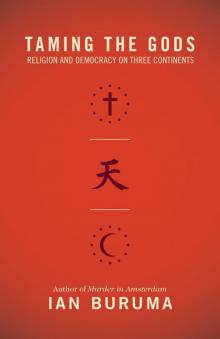 Taming the Gods
Taming the Gods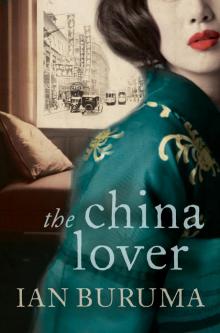 The China Lover
The China Lover A Tokyo Romance
A Tokyo Romance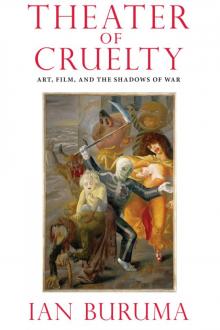 Theater of Cruelty
Theater of Cruelty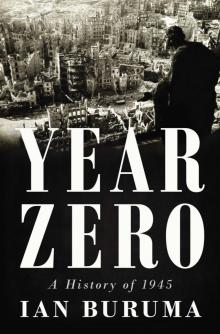 Year Zero
Year Zero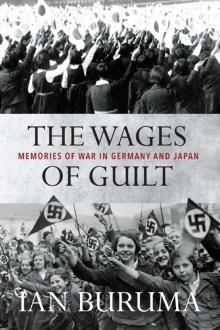 The Wages of Guilt
The Wages of Guilt Murder in Amsterdam
Murder in Amsterdam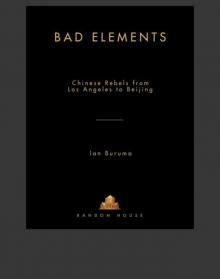 Bad Elements
Bad Elements Their Promised Land
Their Promised Land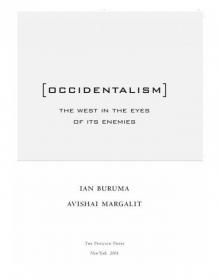 Occidentalism
Occidentalism Anglomania
Anglomania Inventing Japan: 1853-1964 (Modern Library Chronicles)
Inventing Japan: 1853-1964 (Modern Library Chronicles) The Missionary and the Libertine
The Missionary and the Libertine